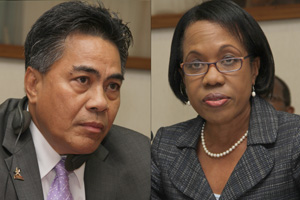New ambassadors watchful of shifting ACP-EU relations
 Brussels, 14 May 2012/ ACP: Ambassadors from Samoa and Jamaica have called for unity and innovation amongst fellow members of the African, Caribbean and Pacific (ACP) Group of States, in view of the Group’s evolving relationship with the European Union (EU).
Brussels, 14 May 2012/ ACP: Ambassadors from Samoa and Jamaica have called for unity and innovation amongst fellow members of the African, Caribbean and Pacific (ACP) Group of States, in view of the Group’s evolving relationship with the European Union (EU).
With recent geopolitical shifts and the approaching expiry date of the current ACP-EU partnership in 2020, on-going Ambassadorial level discussions have focussed on the Group’s future direction, while also taking into account the lasting effects of the global financial crisis on ACP states, the rise of emerging economies and challenges such as climate change, food and energy security, terrorism and pandemics.
“It is against this still unfolding backdrop that the ACP must review wits relationship with the EU and by extension its very own existence,” stated the new Ambassador of Jamaica to the EU, Ms Vilma McNish in her first address to the ACP Committee of Ambassadors on Thursday. “Internal dynamics within the EU itself have altered, particularly since the adoption of the Lisbon Treaty in 2009 which established a new institutional framework to bolster the EU position as a global leader.” (Read full speech PDF)
These changes, she said, are reflected in the latest communications from the European Commission on development cooperation, budget support, and trade and growth development. Ambassador McNish highlighted the special concern of the Caribbean regarding the proposed introduction of differentiation, which will likely threaten middle income economies in the region.
The newly appointed Samoan Ambassador to the EU, Fatumanava Dr Pao Luteru, said the challenges will “test [the ACP’s] solidarity and unity”.
As the former Assistant Secretary General for in charge of Political Affairs and Human Development at the ACP Secretariat from 2000 to 2005, Ambassador Luteru added that the 79-member Group will need to review both its relevance to its constituencies, and its value added and strategic importance as a partner to the EU in the future.
“The ACP-EU partnership is now at a crossroad. What is more worrying for the [ACP] Group, are the subtle and less overt signals emanating from the EU regarding their thinking for the future – signs of disengagement.”
Ambassador Luteru stressed the need for ACP nations to “speak in one voice” to ensure its place on the global stage.
Both delegates underlined the unique composition and potential of the 79-member Group of States, which includes 40 Least Developed Countries and 36 Small Island Developing States.
“Whilst our own national interests are paramount as they should be, we must also not lose sight of the pivotal and key responsibility we owe to the Group as a whole… We must remain united in our thinking, in our actions, and above all, in our belief that our Group can make a difference to the lives of our communities,” Ambassador Luteru told Committee members.
The future of the ACP Group will be the key focus of the Heads of States Summit scheduled for 13-14 December in Equatorial Guinea.
– ACP Press
